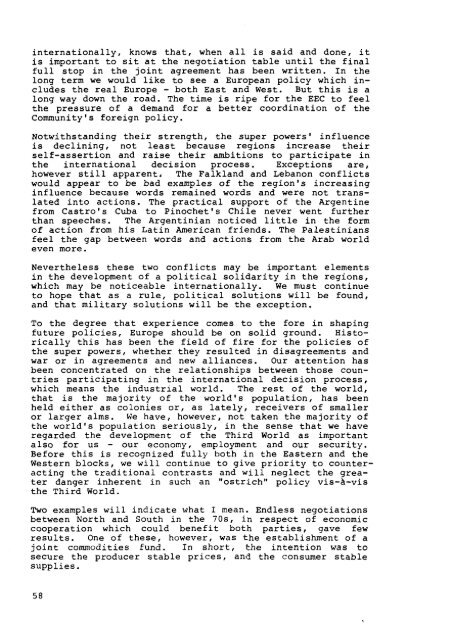Ifda dossier 47, May/June 1985
Ifda dossier 47, May/June 1985
Ifda dossier 47, May/June 1985
Create successful ePaper yourself
Turn your PDF publications into a flip-book with our unique Google optimized e-Paper software.
internationally, knows that, when all is said and done, it<br />
is important to sit at the negotiation table until the final<br />
full stop in the joint agreement has been written. In the<br />
long term we would like to see a European policy which in-<br />
cludes the real Europe - both East and West. But this is a<br />
long way down the road. The time is ripe for the EEC to feel<br />
the pressure of a demand for a better coordination of the<br />
Community's foreign policy.<br />
Notwithstanding their strength, the super powers' influence<br />
is declining, not least because regions increase their<br />
self-assertion and raise their ambitions to participate in<br />
the international decision process. Exceptions are,<br />
however still apparent, The Falkland and Lebanon conflicts<br />
would appear to be bad examples of the region's increasing<br />
influence because words remained words and were not trans-<br />
lated into actions. The practical support of the Argentine<br />
from Castro's Cuba to Pinochet's Chile never went further<br />
than speeches. The Argentinian noticed little in the form<br />
of action from his Latin American friends. The Palestinians<br />
feel the gap between words and actions from the Arab world<br />
even more.<br />
Nevertheless these two conflicts may be important elements<br />
in the development of a political solidarity in the regions,<br />
which may be noticeable internationally. We must continue<br />
to hope that as a rule, political solutions will be found,<br />
and that military solutions will be the exception.<br />
To the degree that experience comes to the fore in shaping<br />
future policies, Europe should be on solid ground. Histo-<br />
rically this has been the field of fire for the policies of<br />
the super powers, whether they resulted in disagreements and<br />
war or in agreements and new alliances. Our attention has<br />
been concentrated on the relationships between those coun-<br />
tries participating in the international decision process,<br />
which means the industrial world. The rest of the world,<br />
that is the majority of the world's population, has been<br />
held either as colonies or, as lately, receivers of smaller<br />
or larger alms. We have, however, not taken the majority of<br />
the world's population seriously, in the sense that we have<br />
regarded the development of the Third World as important<br />
also for us - our economy, employment and our security.<br />
Before this is recognized fully both in the Eastern and the<br />
Western blocks, we will continue to give priority to counter-<br />
acting the traditional contrasts and will neglect the grea-<br />
ter danger inherent in such an "ostrich" policy vis-a-vis<br />
the Third World.<br />
Two examples will indicate what I mean. Endless negotiations<br />
between North and South in the 70s, in respect of economic<br />
cooperation which could benefit both parties, gave few<br />
results. One of these, however, was the establishment of a<br />
joint commodities fund. In short, the intention was to<br />
secure the producer stable prices, and the consumer stable<br />
supplies.
















